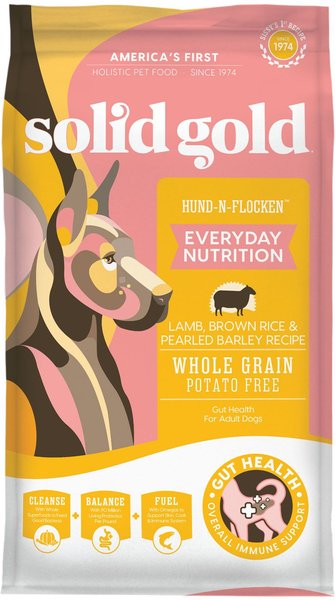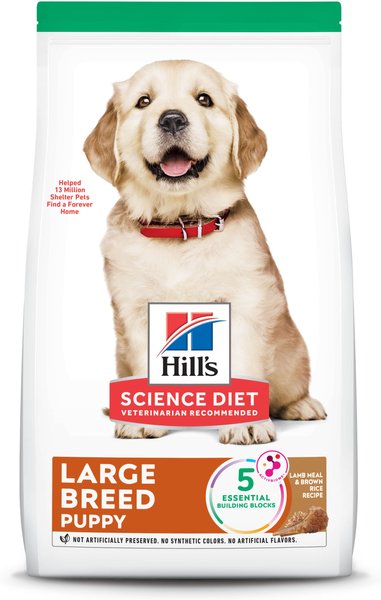- Last Modified
Is lamb dog food better than chicken?
- Authors

- Name
- ChewyChoice team
Introduction
In the evolving realm of pet nutrition, the ongoing quest to determine the optimal protein source for our beloved canine companions remains a topic of great interest among pet caregivers. The debate of "Is lamb or chicken a choice for dogs?" frequently crosses the minds of those deeply invested in their pets well being. As we strive to offer nothing but the best for our friends lamb-based dog food has emerged as a favored option among pet parents.
Renowned for its composition and nutrient-dense profile lamb boasts a plethora of advantages for dogs, across various breeds and sizes. This article aims to explore and compare lamb-based and chicken-based dog food options equipping you with insights to make an educated decision regarding your pet's dietary needs.
Benefits of feeding lamb to dogs
Feeding your dog lamb has several key advantages that contribute to their overall health and well-being. Here are some of the primary benefits:
- High Palatability: Most dogs love the taste of lamb which makes it a top choice for the pickiest eaters.
- Nutrient-Rich Profile: Lamb is packed with high quality protein that helps in building and maintaining body tissue and muscles in dogs. It also provides nutrients like vitamin B12, niacin, and all nine amino acids necessary for your dog's energy levels.
- Omega Fatty Acids: Lamb contains Omega-3 and Omega-6 fatty acids, which are vital for maintaining a healthy and shiny coat.
- Rich in Iron: lamb is rich in iron and can support the production of blood cells and hemoglobin. It plays an important role in various enzymatic functions within your dog's body.
- Digestibility: Lamb is easy to digest and can soothe gastrointestinal distress, making it a suitable option for dogs with sensitive stomachs.
- Hypoallergenic: For dogs with food allergies or sensitivities to common proteins like chicken or beef, lamb is an excellent alternative. Its novel protein profile means it's less likely to trigger allergic reactions.
Benefits of feeding Chicken to dogs
Feeding your dog chicken offers a variety of benefits that support their overall health and vitality. Here are some of the key advantages:
- Lean Protein Source: Chicken provides lean protein, which is essential for muscle development and overall canine health. It's a great way to ensure your dog gets the protein they need without adding unnecessary fat to their diet.
- Versatility: Chicken is a versatile protein choice. It can be included in dog food recipes to cater to dietary needs and preferences.
- Energy and Nutrition: Regarding energy and nutrition, chicken offers dogs a great source of protein to fuel their activities. It also contains vitamins, like B, phosphorus, zinc, and antioxidants which play a role in maintaining a diet..
- Omega-6 Fatty Acids: Chicken is rich in omega-6 fatty acids, which support healthy skin, shiny coats, and strong joints for your friend.
- Low-Fat Content: Chicken is suitable for dogs or those on a low fat diet. It aids in building muscle mass without calories.
- Glucosamine and Amino Acids: Chicken contains glucosamine and essential amino acids, which are crucial for healthy bones and joints. This is particularly beneficial for active dogs and those prone to joint issues.
- Digestibility: Chicken as an option can help soothe their stomach experiencing like vomiting or loss of appetite.
Lamb and Chicken Comparison
When deciding between lamb and chicken for your pet's meal, there are a couple of things to consider. For instance, convenience, flavor, nutrition and potential allergies. Let's break down how lamb and chicken stack up in these areas;
Price:
- Lamb: Lamb-based dog food is generally pricier than chicken because producing lamb meat costs more and it's not commonly used in dog food.
- Chicken: Chicken tends to be more budget-friendly since it's widely available and frequently used in dog food formulas.
Convenience:
- Lamb: While lamb is gaining popularity, it may not be as easy to find as chicken. You might have fewer options at your pet store or grocery store.
- Chicken: Chicken is versatile and easy to find in different types of dog food. You can easily get chicken-based products like kibble, wet food or raw diets.
Flavor:
- Lamb: Many dogs find the taste of lamb irresistible, making it a great option for picky eaters. Its rich, distinctive flavor can be very appealing to dogs.
- Chicken: Chicken is also a highly palatable protein that most dogs enjoy. Its mild flavor is generally well-received by dogs, making it a reliable choice for most pets.
Nutritional value:
- Lamb: Lamb is packed with nutrients like amino acids, vitamins B12, and niacin omega 3 fatty acids and iron. These elements help in muscle growth maintaining energy levels and overall well-being.
- Chicken: Known for being a lean protein source with vitamins B, phosphorus, zinc antioxidants, and omega 6 fatty acids. It promotes muscle development, healthy skin, and coat as well as joint health.
Food Sensitivities:
- Lamb: Lamb is often recognized as a hypoallergenic protein for dogs with food sensitivities or allergies to common proteins like chicken or beef.
- Chicken: Chicken is one of the more common triggers for food allergies in dogs. If your dog shows signs of food sensitivities or allergies you may want to explore protein options such as lamb.
Frequently Asked Questions:
Q: Which is Better for Weight Loss: Lamb or Chicken?
While lamb may not be the choice for weight loss in dogs since its higher fat and carb content compared to chicken. The key factors for dog weight management lie in portion control and regular exercise. To reduce your dog's calorie intake, consider feeding them chicken or turkey.
Alternatively, if your dog has allergies to these meats you can explore fish or leaner cuts of beef as alternatives.
Q: Which is healthier: Chicken or Lamb?
Lamb isn't significantly better than chicken except when it comes to minerals. While chicken tends to be lower in fat, red meats like lamb can have higher levels of important minerals like magnesium, phosphorus, zinc, iron, potassium and calcium.
However, the higher fat content in meats can potentially cause health problems such as heart and blood diseases if eaten excessively without sufficient exercise. Furthermore, your dog typically doesn't require quantities of these minerals unless a vet has diagnosed a specific deficiency. In the end, there's no one answer, for your dog's diet; you'll need to adjust their food over time based on their health and nutritional needs.
Q: Which Meat Has the Highest Protein?
Chicken is well known for having the protein content per ounce compared to other common meats. However, it's crucial to review the nutritional details of your dog's food as the levels of protein can differ depending on the manufacturer. For example, certain lamb-based foods might offer higher protein levels than chicken. So it's vital to conduct research and compare various brands.
Turkey is also low in fat, making it a great substitute for chicken. Both turkey and chicken can be used interchangeably due to their high protein content.
Other meats rich in protein include wild game like elk, deer, bison and fish. While these options are not widely available and can be pricier, they serve as excellent alternatives to chicken if you can find dog food containing them.
Best Lamb Dog Food July 2024
1. Solid Gold Hund-n-Flocken Lamb, Brown Rice & Pearled Barley Recipe Whole Grain Adult Dry Dog Food

Protein
Fat
Carbs
- Lamb
- Lamb Meal
- Brown Rice
- Pearled Barley
- Oatmeal
Pros and Cons:
Pros:
- Good sources of protein: This food has Lamb, Lamb Meal as the ingredients offering healthy protein options for active golden retrievers.
- Carbohydrates for energy: Brown Rice, Pearled Barley and other whole grains ensure a steady energy and fiber supply to keep these lively dogs going.
- Essential fatty acids: Omega fatty acids from sources such as chicken Fat, Flaxseed are present in the food, benefiting the skin and coat health of golden retrievers with both omega-6 and omega-3 fatty acids.
- Probiotics for gut health: Various probiotic strains like Dried Bacillus Coagulans Fermentation Product in the food help support digestion and immunity in golden retrievers.
- Antioxidants: Ingredients like Blueberries and Cranberries offer natural sources of antioxidants and can protect your pup's body from damage caused by free radicals.
Cons:
- Potential allergens awareness: Lamb and Eggs could be potential allergens for some golden retrievers.
Sample Review from buyers
Was recommended this food years ago for a cocker spaniel that would chew his paws. This food resolved the issue completely. Many years later I now feed it to my pibble. This helps with his skin condition and he LOVES it. Will purchase again
2. Hill's Science Diet Puppy Large Breed Lamb Meal & Brown Rice Recipe Dry Dog Food

Protein
Fat
Carbs
- Lamb Meal
- Brown Rice
- Cracked Pearled Barley
- Whole Grain Oats
- Chicken Fat
Pros and Cons
Pros:
- Good sources of protein: This food has lamb meal, and egg product as the ingredients offering excellent animal-based protein options for active great danes.
- Carbohydrates for energy: Brown rice, cracked pearled barley, and whole grain oats provide complex carbohydrates and fiber for steady energy.
- Essential fatty acids: Omega fatty acids from sources such as chicken fat, flaxseed, and fish oil are present, with guaranteed levels of Docosahexaenoic (dha) fatty acids for skin and coat health.
- Probiotics for gut health: Dried beet pulp and dried citrus pulp provide probiotics to support digestion and immunity.
Cons:
- Potential allergens awareness: Chicken, egg, and soybean could be potential allergens for some great danes.
- Plant protein source: This dog food contains pea protein.
Sample Review from buyers
One of my lab pups had issues with growing too fast and diarrhea. The lamb and rice Science Diet puppy food took care of that! Thank you Science Diet!
Share this post